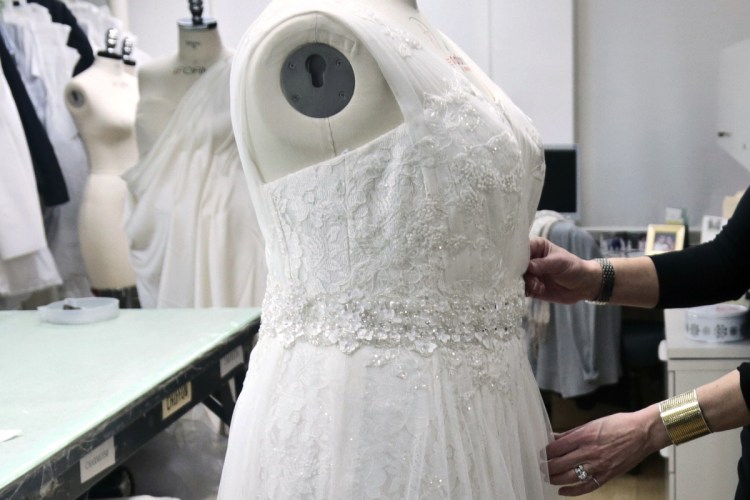David’s Bridal Inc. is going to the courthouse, not the chapel. That could turn some customers into runaway brides.
The largest specialty bridal chain isn’t planning to close stores or interrupt operations, including at the Maine Mall in South Portland. But to the average bride or bridesmaid-to-be, bankruptcy is often misinterpreted, synonymous with the collapse of a business and their wedding plans.
With that in mind, David’s filed for court protection Monday with a goal of emerging by mid-January so the bankruptcy won’t interfere with peak wedding season. It’s also taking more than the usual measures to soothe customers, some of them with thousands of dollars at stake for their big day.
Previous retail filings like Bon-Ton Stores Inc. and Toys R Us Inc. ended in liquidation. And brides-to-be may remember the collapse of the second-largest bridal chain, Alfred Angelo, last year, which precipitously shut down after filing for bankruptcy, said Raya Sokolyanska, a senior analyst at Moody’s Investors Service.
“It’s still pretty fresh in people’s minds,” she said, making messaging to customers crucial.
“We are, and will continue to be open for business, and we hope to see you soon,” Chief Executive Officer Scott Key said in a video on the retailer’s website. Every customer who has a current order with David’s Bridal has received an email confirming the status of her order, tracking information and expected delivery date, a company representative said, and anyone who calls David’s will get a message from Key confirming that there have been no changes to her arrangements or ability to keep shopping.
As of Oct. 31, David’s was holding about $32 million in deposits for 82,000 special orders and owed customers nearly $4 million in merchandise or cash through gift cards, an online cash-reward program and store credit, according to court records.
“There is a risk that they may seek to cancel their orders, seek a return of their purchase deposits or purchase merchandise and services from another bridal retailer,” if brides aren’t quickly reassured that deposits and other customer programs will be honored, the company said.
Both David’s and Alfred Angelo struggled to adapt to changes in fashion and spending habits, a challenge compounded in David’s case by buyout debt that’s weighed it down for years amid shrinking earnings.
Those obligations gave it less flexibility to invest in needed capabilities like digital, Sokolyanska said. The rise of online competitors and wedding sites also put pricing pressure on traditional retailers, she said.
Nor did changing preferences help what Sokolyanska calls “the Walmart of wedding gowns.” While spending on higher-end weddings picked up after the recession, David’s core lower-income customers started delaying or scaling back their celebrations. Meanwhile, bridesmaids, a key part of the business, were seeking more individual and affordable dresses.
Executives have taken steps to stem the decline, she said, adding more plus-sized and special-occasion merchandise. David’s has also done well with its higher-end Vera Wang dresses, but not enough to offset the declines from its lower-income customers.
“Operating in this environment is more expensive,” she said.
It’s also more demanding, all in a quest to win and please shoppers who in most cases aren’t going to be repeat customers. “The stakes are high and things have to be perfect,” Sokolyanska said. “It’s hard to please that bride. Emotions run high and they can spill out on social media.”
David’s began life 68 years ago as Phillie Bridals with one salon in Fort Lauderdale, Florida. The turn of the century brought a procession of suitors: May Department Stores bought the chain in 2000 before merging with a rival, which sold it to private-equity firms Leonard Green Partners and TPG Capital in early 2007. Five years later, Clayton, Dubilier & Rice took control in a $1.05 billion leveraged buyout.
David’s is the latest in a procession of merchants outrun by buyout debt. It’s been in active talks with its creditors for weeks and, through the bankruptcy, will hand over equity in the reorganized company to senior lenders including Oaktree Capital Group.
A quick reorganization is essential, said Jeffrey Schwartz, a bankruptcy attorney at McKool Smith, because costs pile up and “things generally don’t get better with too much time.” If the company controls its messaging properly, “it should be business as usual.”
The restructuring will give David’s more money to invest in growth, and it plans to emerge with all of its stores intact and ample financing. Still, Sokolyanska at Moody’s doesn’t envision a second honeymoon for its growth outlook.
“I see this as more of a story of maintaining what they have as opposed to a growth opportunity,” she said. “I don’t think they go back to the type of profitability they had in the past.”
Bloomberg’s Steven Church contributed.
Copy the Story LinkSend questions/comments to the editors.



Success. Please wait for the page to reload. If the page does not reload within 5 seconds, please refresh the page.
Enter your email and password to access comments.
Hi, to comment on stories you must . This profile is in addition to your subscription and website login.
Already have a commenting profile? .
Invalid username/password.
Please check your email to confirm and complete your registration.
Only subscribers are eligible to post comments. Please subscribe or login first for digital access. Here’s why.
Use the form below to reset your password. When you've submitted your account email, we will send an email with a reset code.